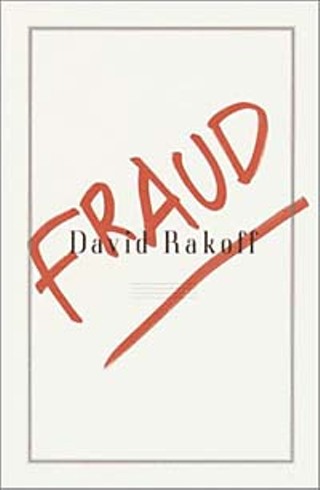Summer Reading
By Marc Savlov, Fri., June 1, 2001

Fraud
by David RakoffDoubleday, 228 pp., $21.95
I often entertain the dream that David Rakoff isn't the charming, suave-yet-jaded New York author appearing on his dust jacket, but is, instead, a stunted, dwarfish fellow, just a goat hair above trollism, who calmly bides his time waiting for errant out-of-towners beneath the Brooklyn Bridge, sharpening both teeth and wit on their pitiful, non-sequitur cries of "No more pillows, please!" while he rakes them across the coals of his urbanely razored wit and giggles mindlessly. It's disturbing, I know, but then surely no sane man can be both this funny (sorry, amusing) and trenchant in a single sentence's breadth, and, what the hell, let's face it, it's better than that dream about the hesher satanists I keep having.
Fans of NPR's This American Life and its coterie of cynical-yet-ever-hopeful-in-the-face-of-unrelenting-adversity New York literary bon vivants (Sarah Vowell, David and Amy Sedaris) will already be familiar with Rakoff's undeniable charms. He drops by Ira Glass' show from time to time to do a reading, and the occasion always seems to end in my pulling my truck over to the side of the road so as to avoid colliding with my fellow travelers in either lane as the laughter -- nay, mirth -- explodes from my rippling gut like a baby chestburster in search of a warm Sigourney. "I'm sorry, officer, but it's all that Rakoff guy's fault" isn't a line I've practiced well enough to maintain a straight face during the utterance of.
But I digress. For the uninitiated, Rakoff freely admits to having a longstanding longing to have been part of that semi-mythical Algonquin Round Table, a sort of Robert Benchley/Dorothy Parker combo (partly on account of his being gay and partly because they were the two swellest of the bunch). His essays on everything from the horrors of being trapped on the lower rungs of the New York publishing industry ("Lush Life") to the perils of teaching high school in New York via Austria ("We Call it Australia") are gently snide. Rakoff's wit is drier than a sawdust martini, and just as perfect. The 15 essays that make up Fraud -- I like to think of them as "bite-sized dollops of wackiness" -- are to a one enormously satisfying, full of the kind of mordant chuckles that are best left issued at home, rather than on public transportation, where they will draw nervous stares from even the most Kramdenesque of bus drivers (trust me on this). It's fine, then, not to have to wait until the nasal whine of Ira Glass emits the words I weekly wait to hear: "This week on This American Life, David Rakoff reads something he wrote that is terribly funny, yet observant of the human condition, and ultimately somehow touching." After all, it's right here on my bookshelf, now, isn't it?








